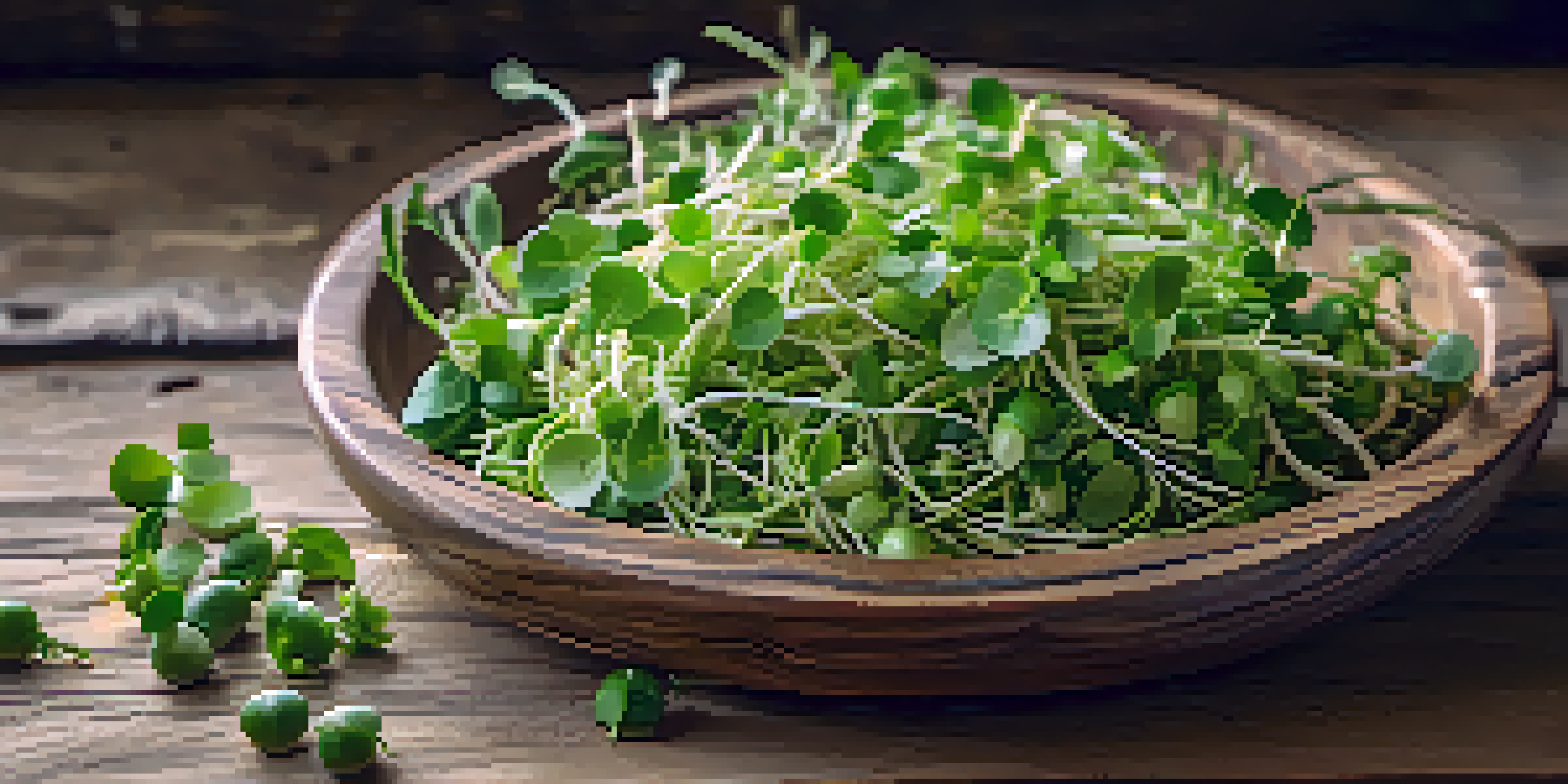How Sprouts Support Digestive Health in Raw Food Diets

Understanding Sprouts and Their Nutritional Value
Sprouts are young plants that are packed with nutrients and enzymes. These tiny powerhouses are easy to incorporate into various dishes, making them a popular choice in raw food diets. Loaded with vitamins, minerals, and fiber, sprouts can significantly enhance your overall health.
Let food be thy medicine and medicine be thy food.
One of the most appealing aspects of sprouts is their rich concentration of essential nutrients. For example, alfalfa sprouts are high in vitamin K, while broccoli sprouts contain sulforaphane, a compound known for its antioxidant properties. This nutrient density is especially beneficial for those following a raw food diet, where maximizing nutrient intake is a priority.
Beyond their nutrient content, sprouts are also incredibly versatile. You can toss them into salads, blend them into smoothies, or use them as a garnish on various dishes. Their mild flavor and crunchy texture can elevate any meal, making them a delightful addition to your raw food repertoire.
The Role of Fiber in Digestive Health
Fiber is a crucial component of a healthy digestive system, and sprouts are an excellent source of it. Consuming adequate fiber helps to maintain regular bowel movements and promotes a feeling of fullness, which can assist in weight management. By including sprouts in your diet, you are not only boosting your fiber intake but also supporting your gut health.

When sprouts are consumed, they contribute to both soluble and insoluble fiber in your diet. Soluble fiber helps to soften stool and make it easier to pass, while insoluble fiber adds bulk to your stool, preventing constipation. This balance of fiber types is essential for maintaining a well-functioning digestive system.
Nutrient-Dense Power of Sprouts
Sprouts are packed with essential vitamins, minerals, and enzymes that enhance overall health and digestion.
Moreover, the fiber found in sprouts acts as a prebiotic, feeding the beneficial bacteria in your gut. A thriving gut microbiome is linked to improved digestion, enhanced immunity, and even better mood. By incorporating sprouts into your raw food diet, you're nurturing your gut flora while promoting overall health.
Enzymes in Sprouts: A Digestive Aid
Sprouts are rich in enzymes, which play a vital role in breaking down food and aiding digestion. These enzymes help to convert complex nutrients into simpler forms, making it easier for your body to absorb essential vitamins and minerals. This is particularly beneficial for those on a raw food diet, where enzymes are often consumed in their natural state.
You are what you eat, so don't be fast, cheap, easy, or fake.
The presence of enzymes in sprouts can also alleviate common digestive issues such as bloating and gas. By supporting the digestive process, these enzymes help ensure that your body efficiently breaks down the raw foods you consume. It’s like having a personal helper in your gut, working hard to keep everything running smoothly.
Incorporating sprouts into your meals can enhance digestive comfort and efficiency. For example, adding a handful of sprouts to your salad or smoothie can provide a digestive boost, making your meals not just nutritious but also easy to digest. It’s a simple way to enjoy the benefits of enzymes without additional supplements.
The Impact of Raw Food Diets on Digestion
Raw food diets emphasize the consumption of uncooked and unprocessed foods, which can be beneficial for digestion. These diets are often rich in fruits, vegetables, nuts, and seeds, providing a wealth of nutrients and fiber. However, some individuals may experience digestive discomfort when transitioning to a raw food diet due to increased fiber intake.
Sprouts can help ease this transition by providing a gentle source of fiber and enzymes. Their high digestibility means they are less likely to cause bloating or discomfort compared to other raw foods. Including sprouts in your raw diet can make it easier for your digestive system to adapt to the new dietary changes.
Fiber's Role in Gut Health
The fiber found in sprouts supports digestive health by promoting regular bowel movements and nourishing gut bacteria.
Additionally, the variety of sprouts available allows for increased diversity in your diet, which is essential for a healthy gut. A diverse diet supports a varied microbiome, which is linked to better digestive health. By rotating different types of sprouts, you can keep your meals interesting while promoting optimal digestion.
Hydration and Its Role in Digestion
Staying hydrated is crucial for digestive health, and sprouts can aid in this aspect as well. Many sprouts have a high water content, which can contribute to your overall hydration levels. Proper hydration helps to soften stool and prevent constipation, making it easier for your body to eliminate waste.
Including water-rich foods like sprouts in your raw food diet can complement your fluid intake. This is especially important in warmer months or during physical activity, when your body loses more water. By snacking on sprouts or adding them to your meals, you’re not only nourishing your body but also promoting hydration.
In addition to their water content, sprouts can also help balance electrolytes in your body, which are vital for maintaining fluid balance. They provide essential minerals like potassium and magnesium, supporting various bodily functions, including digestion. So, keep those sprouts handy to help quench your thirst and support your digestive system!
Sprouts and Gut Microbiome Health
The gut microbiome plays a significant role in digestion and overall health, and sprouts can positively influence its composition. By serving as a prebiotic, sprouts provide nourishment for beneficial gut bacteria. A healthy microbiome is linked to improved digestion, reduced inflammation, and enhanced immune function.
Research suggests that a diverse diet rich in plant-based foods, including sprouts, supports a thriving gut microbiome. The unique compounds found in different types of sprouts can encourage the growth of various beneficial bacteria. This diversity is key to maintaining a balanced gut environment, which is essential for optimal digestion.
Hydration Benefits of Sprouts
Sprouts help maintain hydration and electrolyte balance, which are crucial for effective digestion.
Incorporating a variety of sprouts into your raw food diet can help promote a healthier microbiome. For example, mixing different types of sprouts in salads or wraps not only adds flavor and texture but also boosts the diversity of nutrients and prebiotics that feed your gut bacteria. This simple practice can lead to significant improvements in digestive health.
Practical Tips for Adding Sprouts to Your Diet
Adding sprouts to your raw food diet is easier than you might think. Start by incorporating them into your salads, smoothies, or sandwiches for an instant nutrient boost. You can even sprinkle them on top of soups or grain bowls to enhance flavor and texture.
Experimenting with different types of sprouts can also keep your meals exciting. From crunchy radish sprouts to sweet pea shoots, each variety offers a unique flavor profile and nutritional benefits. Consider visiting local farmers' markets or health food stores to discover fresh options.

Lastly, don’t forget that you can grow your own sprouts at home! With just a few seeds and a jar, you can cultivate a continuous supply of fresh sprouts. This not only saves money but also ensures you have the freshest ingredients available for your raw food creations.